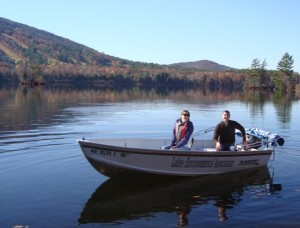These reports compile the previous year’s water quality monitoring information and usually come out between February and April. LEA’s Water Quality Monitoring Reports are broken up into sections.
This year, LEA’s water testing summary is being published as one document with four chapters. The table of contents includes clickable links that will take you directly to your lake of interest. Lakes participating in multiple testing programs have buttons on the top right hand corner of their data summary pages. These buttons will take you to that lake’s summary in each chapter.
2024 Reports:
2023 Reports:
LEA’s 2023 Water Testing Summary
2022 Reports:
Chapter 1 – Traditional Water Monitoring Reports
Chapter 2 – Automated Monitoring Buoys Report
Chapter 3 – High Res. Temp. Monitoring Report
Chapter 4 – Algae Monitoring via Fluorometer Profiles
2022 Mid-season Water Testing Report (August)
2021 Reports:
Chapter 1 focuses on our traditional water testing: dissolved oxygen, chlorophyll-a, total phosphorus, clarity, and overall lake health
Chapter 2 presents data from automated monitoring (GLEON) buoys
Chapter 3 details high-resolution temperature monitoring results
Chapter 4 is a summary of algae monitoring via fluorometer data
2020 Reports:
Chapter 1 focuses on our traditional water testing: dissolved oxygen, chlorophyll-a, total phosphorus, clarity, and overall lake health
Chapter 2 presents data from automated monitoring (GLEON) buoys
Chapter 3 details high-resolution temperature monitoring results
Chapter 4 is a summary of algae monitoring via fluorometer data
2019 Reports:
Chapter 1 focuses on our traditional testing: Dissolved oxygen, chlorophyll, phosphorus, and clarity, as well as overall lake stats
Chapter 2 presents high-resolution (GLEON) monitoring buoy data
Chapter 3 details high-resolution temperature monitoring results
Chapter 4 is a summary of algae and fluorometer testing data
Chapter 5 presents spatial analysis data
